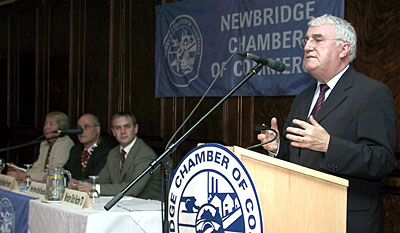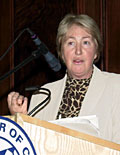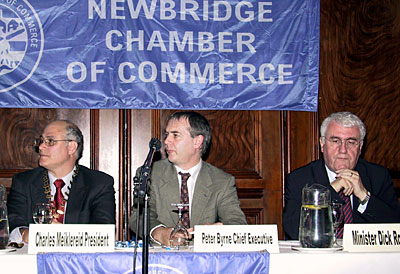
NEWBRIDGE, 8 October 2002: Sean O Fearghaill TD was getting it told to him straight.
“Where I work, a lot of people are saying they’ll vote against the Nice Treaty to get back at the Government,” a constituent was telling him.
“How will that ‘get back’ at the Government?” Kildare’s newest Fianna Fail TD answered, and he seemed genuinely puzzled that anyone would even WANT to ‘get back’ at the current coalition.
“And a lot of people are still confused,” he was told.
“But what’s confusing about it?” he asked rhetorically.
Well, the electorate won’t have had their confusion lessened after last night’s debate on the Nice issue organised by Newbridge Chamber of Commerce. Not because the clarifications weren’t there. But because the electorate wasn’t.
About 25 in all turned up to the Stand on the Curragh. Four of us news media. Several members of the Newbridge Chamber. A bundle of local Fianna Fail activists. An eight-year-old with her mum for whom the whole thing will be old history before she ever gets to vote. And a couple of people who probably go to all these things because they have their own agendas to highlight.
“There was another Nice meeting in the area within the last week, and I think that might have exhausted the interest,” event chairman Peter Byrne, chief executive of South Dublin Chamber of Commerce said. But he admitted afterwards that it might have been better to hold it somewhere more central to Newbridge, like the Riverbank Theatre. But the owner of the Stand House has been very supportive of the Newbridge Chamber.
The debate itself WAS informative, more particularly because the ‘yes’ speaker, Government minister Dick Roche is articulate, knows his stuff, and is committed to his party’s stance. This was his 56th public meeting on the current Nice bandwagon and it showed. Indeed, if all the confuseds, anti-Nicers and anti-Governmenters had a chance to hear him, he’d probably switch enough of them to single-handedly win the referendum for the ‘yeses’.
Which was a point made even by his opposition last night, Nuala Ahern MEP of the Green Party, whose performance was, bluntly, less impactive. Indeed, it was clear by the end that the pair had many more things in common on the European Project than divided them.
The minister opened proceedings to deal with the suggestion that Ireland’s voting influence would be lessened by the implementation of the treaty, and the subsequent enlargement. Yes, we WOULD diminish our current 3.4% of the total vote, but it would be diluted anyway even if accession by other countries to the EU was done by other means should the Nice Treaty fall. The balance would be that we would gain more allies with new membership, and the treaty would allow groups of eight or more countries to work together for their mutual benefit.
On the projected loss of our veto in the Nice framework, minister Roche noted that much of the EU’s work is already being done ‘largely by consensus’, and there had never been an occasion when the big countries had ‘acted together to do down the small’.
He also reminded the audience that the country’s main business organisations and the unions had both indicated they supported the Nice agenda, because they believed it would have a positive impact on jobs and the economy. “I have consistently challenged the ‘no’ side to come up with just one clear economic disadvantage by going forward, and they have consistently failed to do so,” he said. “On the other hand, I can come up with many positive economic reasons.”
He concluded with the idea that we have a ‘moral’ imperative also to ‘open the door’ to 110m people who had previously been locked up behind the Iron Curtain and who now qualified to join the union. “They have literally ‘come in from the cold’ and we have the key to the door to let them in,” he said. “Every time that the EU expanded in the past, Ireland gained. On a per capita basis, Ireland is the most successful trading nation in the modern world, and we can only gain by expanding our European market to some 500 million people.”
 Nuala Ahern, on the other hand, told the listeners that her concern was the ‘fundamental flaw’ that in the new arrangements, a commissioner would be lost on a rotating basis once the membership of the EU reached 27. Although all commissioners officially leave behind their national and political links when appointed to Europe, she suggested that they still represented a link to decision-making in Europe for their own countrypeople, particularly as they weren’t just individuals but had a large cabinet of their own people working for them.
Nuala Ahern, on the other hand, told the listeners that her concern was the ‘fundamental flaw’ that in the new arrangements, a commissioner would be lost on a rotating basis once the membership of the EU reached 27. Although all commissioners officially leave behind their national and political links when appointed to Europe, she suggested that they still represented a link to decision-making in Europe for their own countrypeople, particularly as they weren’t just individuals but had a large cabinet of their own people working for them.
She said that the last ‘no’ vote from the Irish people had come as a ‘shock’ and a ‘wake-up call’ to other leaders in Europe, some of whom admitted that if the treaty had been put to their own citizens in referenda like the Irish one, it would probably have been similarly rejected.
Ms Ahern slightly diluted her own argument when she said there were already signs that the ‘loss of commissioner’ situation would be changed in some future treaty or other provision, with perhaps an announcement on that in ‘coming weeks’, but she said this vote was about the existing treaty proposal and ‘not anything around it’.
And she suggested that substantial changes in the way the EU worked must be put in place if it were to be a 21st century organisation. As an example, she noted that the English-speaking world organised itself on the basis that ‘everything is permitted unless forbidden’, while the countries following the Napoleonic Code kind of system worked on the basis that ‘everything is forbidden unless it is allowed’.
“I think you can’t run a 21st-century Europe on the basis of just telling people what is allowed,” she said, and emphasised that this vote would determine how an enlarged Europe would be operated.
Both debators agreed that there were elements within the current union who actually didn’t want enlargement to proceed as fast as envisaged, and they would be ‘glad to be able to blame Ireland’ if a failure of the Nice Treaty did slow accession of other members.
Ms Ahern said in conclusion that the Irish electorate ‘can’t’ retreat from the answer they gave to Nice last year. “That was our answer,” she said.
Minister Roche said the balance of Ireland’s interest lies in not delaying for 10 or 11 years the accession of people who ‘would be our allies’ and he reminded the audience how General de Gaulle of France had done precisely that when he said ‘non’ to the admission of Ireland which delayed our own accession for a dozen years. “As far as I am concerned, if we have a bigger, more powerful, and more democratic Europe, then everybody wins,” he said.
Meanwhile, back at the local level, Deputy Sean O Fearghaill got one further bit of advice from his constituent.
“I’ve been canvassing, but I don’t think we’ll get around to everybody,” he mused.
“Look, yourselves, the PDs, Fine Gael and Labour are all on the one side in this,” came the answer. “It can’t be beyond possibility that you get together and divide the job up between you, surely?”
“I hadn’t thought of that. I’ll report it back,” the deputy said with genuine interest.
The night might not have been wasted.


